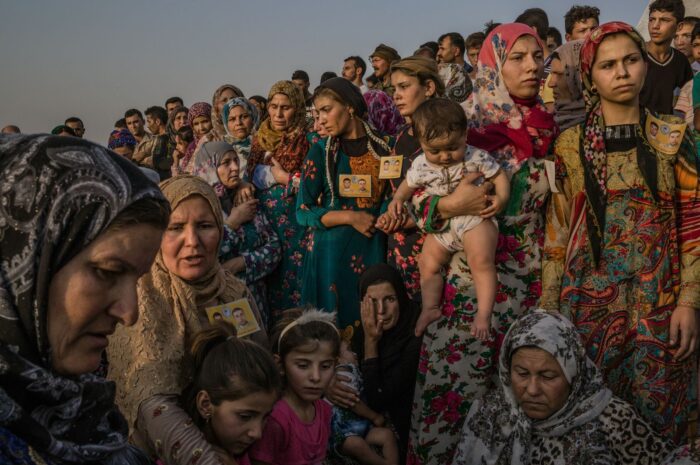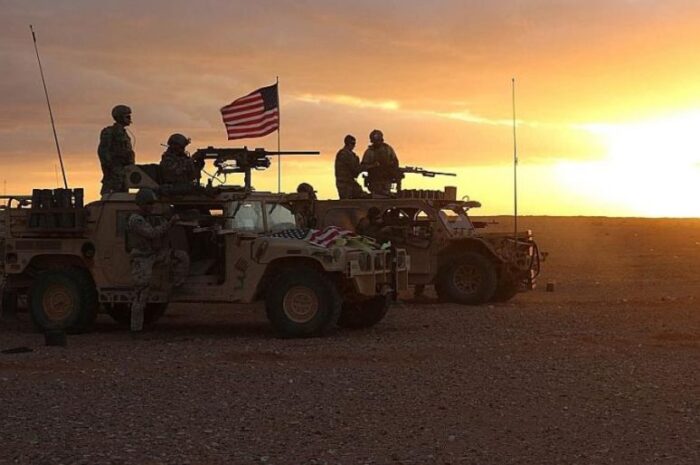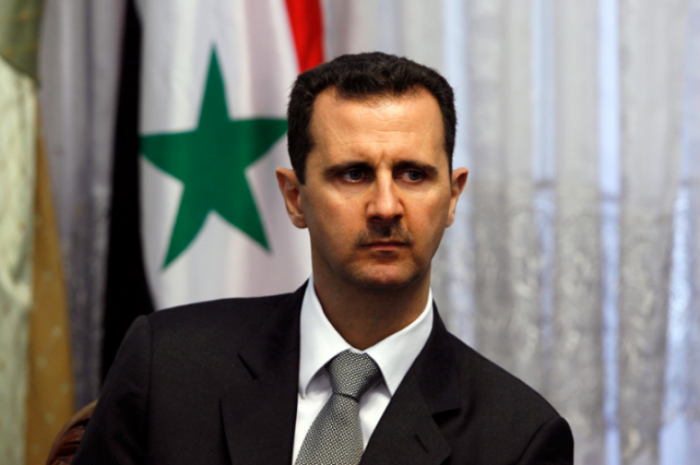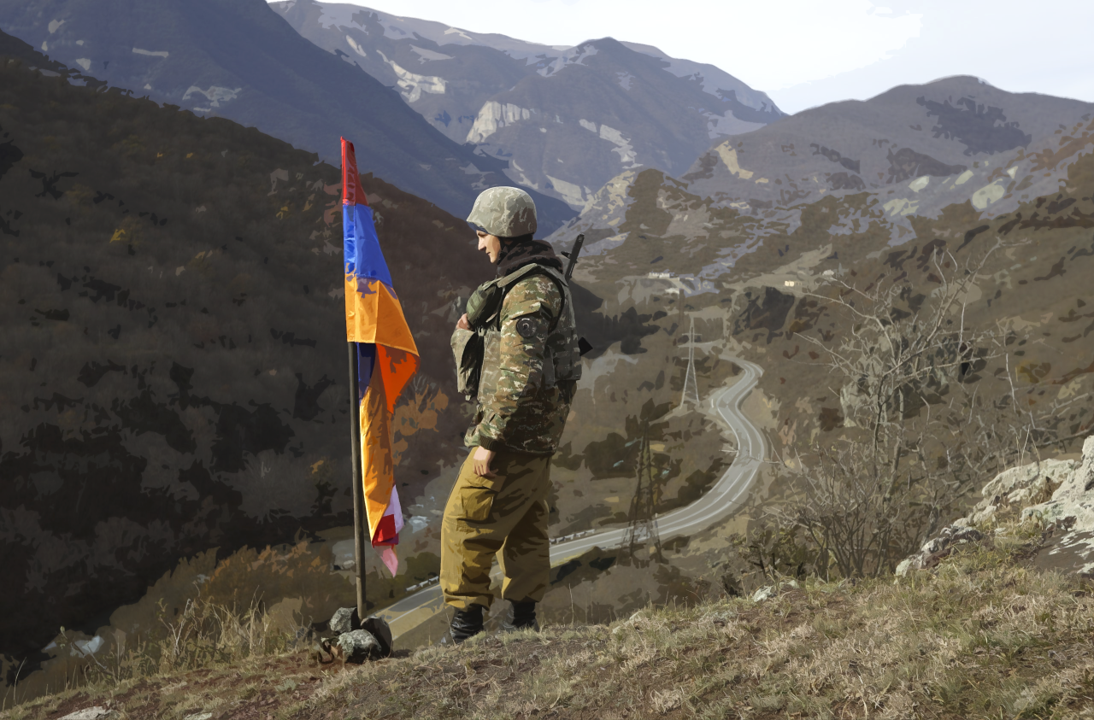
Note: The following article originally appeared in Geopolitical Monitor.
Armenia is facing another existential crisis.
Azerbaijan is blockading the small statelet of Artsakh (Nagorno-Karabakh), preventing medical, fuel, and food supplies from entering the country. An emboldened Ilham Aliyev is taking advantage of this situation to stoke the flames of prejudice and push Azeri forces into Armenia proper. Armenians are now confronted with the real possibility of a threat to their very identity.
The Consequences of War
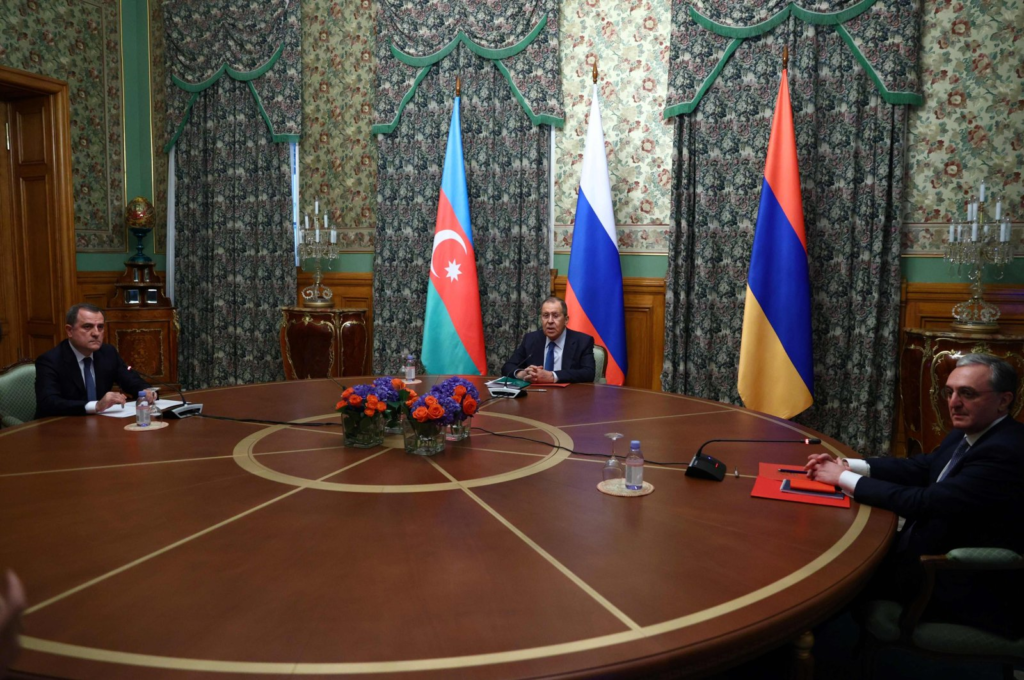
The Second Nagorno-Karabakh conflict in 2020 forced Artsakh’s president, Arayik Harutyunyan, to cede large portions of territory to Azerbaijan for the first time in decades. Azeri forces, equipped with firepower and mercenaries from neighbouring Turkey, pushed deep into the statelet, taking multiple cities from Armenian forces. Azeri forces left a trail of atrocities during the month-long engagement. At the end of the war, Armenia’s “friend” Russia brokered a tenuous ceasefire agreement that left Artsakh crippled and Armenia in a state of shock.
Armenia’s prime minister, Nikol Pashinyan, called the arrangement at the time, “unbelievably painful for me and my people.” The agreement left Artsakh with four key cities and dozens of villages lost to Azeri occupation. A disinterested Putin gave the security of Armenia to the authoritarian leader of Azerbaijan and by extension Recep Tayyip Erdogan, while Armenians were left with nothing but occupation. The importance of this agreement cannot be understated because the conditions agreed therein, such as Clause 9 stating that, “all economic and transport connections in the region shall be unblocked” have yet to be honoured.
Russian peacekeepers deployed to disputed areas around Artsakh are failing to maintain the peace; Azeri forces have attacked regions such as Martuni with artillery and harassed Armenian forces to test the limits of the ceasefire. Aliyev’s forces are empowered to do this by the change in attitude of Putin. Despite Armenia being part of the CSTO (Collective Security Treaty Organisation), Putin is pivoting towards Azerbaijan in diplomatic and economic matters, while sidelining Armenia.
Pashinyan, echoing the sentiment of many Armenians that feel Russia is not taking their concerns seriously, voiced the possibility of Armenia leaving the CSTO in May. Speaking to Yerevan media and quoted by the Moscow Times, Pashinyan said that “I am not ruling out that Armenia will take a decision to withdraw from the CSTO…” The reason for the bulk of discontent with Moscow is because of a lack of action that Russian peacekeepers are taking in the emerging humanitarian crisis in Artsakh.
The Lachin Corridor Crisis

The Lachin corridor that connects Artsakh with Armenia, and the outside world has been blocked since December 12. Azeri agitators operating under the veil of eco-activists have blocked the only road into the enclave. This agitation is a deliberate provocation by the Azerbaijan government to constrain 120,000 residents in a show of force to Yerevan and Stepanakert. Azeri forces are bolstering the blockade through deployment of forces, cutting off gas supply and creating a security checkpoint to regulate traffic into the region to suffocate Artsakh. This is despite the ruling by the International Court of Justice (ICJ) in the Hague to unblock the road in late February this year.
What is the justification from Baku for this?
Azerbaijan wants to reclaim control over the corridor and pressure the parties to the original agreement to acquiesce to Azerbaijan’s revanchist claims over Artsakh. This provocation is just a continuation of a series of moves that Aliyev feels empowered to make in the wake of Baku’s victory in 2020 and Moscow’s embroilment in Ukraine. It is a provocation impacting the lives of Armenians, disregarding international humanitarian norms, and showing the world the extreme nature of Azerbaijan’s war against its neighbour.
Growing Anti-Armenian Sentiment

soldiers on April 12, 2021. Source: Pres AZ
Aliyev’s victory over Artsakh is emboldening a new wave of anti-Armenian sentiment, with the long-standing leader of Azerbaijan increasing his genocidal rhetoric against Armenians. The war had offered a new vehicle for the Azerbaijan government’s longstanding prejudice. An example of this is on full show with Baku’s “Military Trophies Park” where adults and children can walk around displays that dehumanise Armenian soldiers and include the real helmets of dead Armenians. Visitors to the museum can see the victory of Azeri soldiers over the destroyed vehicles, helmets, and equipment of Armenians in what can only be best described as a public show of jingoist hatred.
In December, during the start of the blockade, Aliyev proclaimed to the nation in a speech that, “present-day Armenia is our land” and, “When I repeatedly said this before, they tried to object and allege that I have territorial claims. I am saying this as a historical fact. If someone can substantiate a different theory, let them come forward.”
These irredentist claims set forth by Aliyev makeup the Baku government’s new, “Great Return” policy. The policy that is ongoing aims to resettle Azeri people onto Armenian land under the guise of restoring “Western Azerbaijan” to its “former” glory. Aliyev is sending thousands of Azeris to resettle Artsakh and take the homes of former Armenian residents.
Last month on a visit to the newly incorporated city of Lachin, Aliyev told residents that Armenians living in Artsakh “either…will come to us humbly, or events will develop in a different direction”. This is important to note, because Aliyev is not joking with these words and his government is enacting policies designed to change the demographics of the region—in other words, ethnic cleansing. Every action, including the blockade, is a message to Yerevan and to the people of Armenia that they are not welcome in the region.
The Fear of Genocide

Balayan
The Armenian people suffered one of the greatest genocides in history. What they see happening in Artsakh is an occupying power that threatens to erase the Armenian identity.
“We are not speaking about political or inter-ethnic conflict, we are talking about ongoing process of genocide, and not just its preparation.” Pashinyan told AFP in a recent interview in July, referring to the situation in Artsakh.
The prime minister is not exaggerating the situation with this hyperbolic phrasing. Officials from the International Association of Genocide Scholars (IAGS) are noting that the actions of the Azeri government with its rhetoric, blockade and atrocities towards Armenians are “significant genocide risk factors.” It is not an exaggeration then to state that the actions of the Azeri government are deepening this concern.
People are rallying to speak out against the blockade in the streets of Stepanakert left unoccupied by Azerbaijan. Loved ones in neighbouring Armenia are showing an outcry of support for those facing starvation in the fledgling republic. I spoke with Ani Poghosyan, an Armenian Human Rights advocate and producer who has long been following this situation from its onset. I asked her what she would like the world to know about what is going on…

“The disregard of Artsakh and Armenia is very shortsighted.” She went on to say: “It’s terribly shocking and heartbreaking just how lonely and abandoned Armenians are in their fight against a dictatorship the brutality of which at times far exceeds that of Russia. If we as a global community are to stand for what is right (just as we are rightfully doing so for Ukraine), then we should be very straightforward and bold in the pushback against the dictatorship of Baku. Abandoning of principles for shortsighted interests is like opening Pandora’s box.”
Ani’s concerns represent the concerns of many Armenians trapped in Artsakh and those in neighbouring Armenia including those in the international diasporas abroad. Armenians are doing their part to raise awareness of a critical situation developing in their homeland. Armenian National Committee of America is just one organisation amongst many that is currently providing members of Congress and public officials information on the situation in Artsakh.
The Senate Foreign Relations Committee’s Robert Menendez is one official that is vocal about the situation in the region. Speaking about the blocking of International Committee for the Red Cross (ICRC) aid workers to the Lachin Corridor by Azeri troops, Menendez said the following:
“More than 7 months into Azerbaijan’s blockade, the time is now for the US & its allies to exert pressure on Aliyev. Lives hang in the Balance.”
Menendez’s sentiment reflects growing concern within Congress of the need for action against the Azeri government for this affront to international norms and violation of human rights.
What Should Be Done?

The current situation in Artsakh is at a critical juncture.
Tens of thousands of people are cut off from aid. International aid organisations such as the ICRC are unable to move through the Lachin corridor. Requests from legal bodies like the ICJ and European Court of Human Rights (ECHR) to unblock the passage are being ignored by Azeri authorities. Armenian interlocutors in Yerevan and Stepanakert are left now with little option but public appeal.
There are still options available to the international community to stop the situation from escalating. These actions are complicated to enact but involve measures that aim to open the corridor and address the situation directly.
Artsakh is still not recognised as an independent polity by the international community. The non-recognition of Artsakh is used to bar the government in Stepanakert from negotiations over the Nagorno-Karabakh. Appealing to the United Nations General Assembly or more importantly the Security Council to recognise a viable way forward to acknowledge the self-determination of the people of Artsakh and arrange a formal treaty to protect those people’s rights. If this is not possible to do, then an action in remedial secession should be supported.
Remedial secession refers to the act of a region, territory or aspiring state seeking unilateral secession from a parent state in response to grievous human rights abuses or systemic discrimination to its population. It is a controversial position to support since it directly challenges the principle of territorial integrity of the parent state, but if negotiations and other peaceful measures are not sought, then remedial secession may become a viable last resort option. The most notable case of this was when Kosovo enacted remedial secession to separate from Serbia.
Another argument is to set up a demilitarised zone in the Lachin corridor. A demilitarised zone that is observed by a concert of international observers beside Russian peacekeepers, so France, Germany, and other EU states or alternatively the US, would help maintain a semblance of order in the area and allow for the free movement of people in and out of the zone. International peacekeepers that are not direct party to the ceasefire accords will get push back from Russia and Azerbaijan, which is why that pushing such measures through the UNSC or European Parliament should be considered.
A more poignant consideration is pressuring Azerbaijan to stop through the imposition of targeted sanctions on the Azerbaijan government and defence sector can limit Azeri forces. The United States and EU have a variety of sanctions available to utilise in applying pressure to the government, such as the Magnitsky sanctions, CAATSA sanctions (for Russian weapon procurement) and other similar policies (a reversal of the waiver on Section 907 of the US Freedom Act should also be considered). What the aim should be with any form of targeted sanction is to prevent the Azerbaijan government from pursuing hardline policies against Armenians.
International observers can do their part to raise awareness on the situation unfolding in Artsakh. Petitioning local congress and parliamentary officials to voice up about this situation is something that readers can practically do. The Azerbaijan government is deathly afraid of international attention on this issue. It works within its own country to suppress vocal criticism. If there is enough pressure, then it cannot suppress discontent on an international level.
A Warning from History

Aliyev’s government is determined to maintain a strong hold of Artsakh. This determination mirror’s the passion of Slobodan Milosevic’s government in keeping Kosovo within Serbia. Kosovars during the conflict in the Balkans fought extensively to free themselves from the oppression of Milosevic’s regime. NATO even intervened in the late 1990s to avert genocide with an eleven-week bombing campaign. This campaign forced Milosevic to the negotiating table.
The war in Kosovo provides a historical warning of what can happen if the situation is allowed to escalate to the point of no return. There are other historical tragedies that can be evoked, but the point is clear that the crisis in Artsakh needs immediate resolution.
Written by Anthony Avice Du Buisson (12/09/2023)

